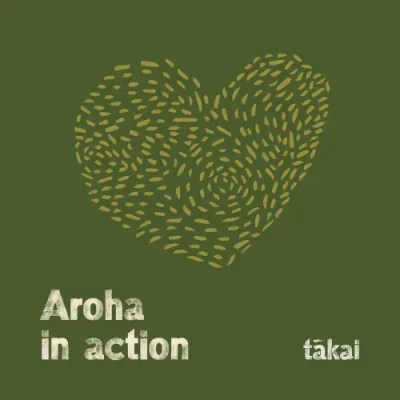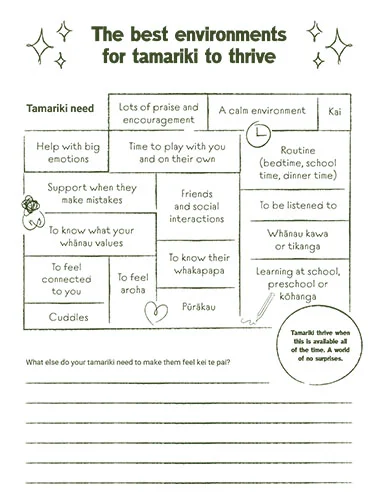
Helping tamariki deal with trauma
Traumatic experiences can have a long-lasting effect on tamariki because their brains, bodies and understanding of the world are still developing. Healing is possible, but to do this they need help from the special people in their life.
Individual trauma involves an event or events that are experienced by tamariki as psychologically, physically, or socially harmful, or as having the potential to be harmful. Sometimes these distressing events may even be life-threatening. They can have lasting negative effects on one or more areas of their life and development. It can be a one-off event or a series of events over time. It can be emotional, such as losing a grandparent, or physical, such as being abused or seeing others being abused.
It can help for whānau to understand that the ways tamariki show their feelings and react to trauma may be different from how adults react, and that they may need support, even if they don’t ask for it.
Different tamariki will react in different ways, even to the same situation. There is no right or wrong way to feel when something bad has happened. Saying things like “cheer up” or “get over it” or “don't be sad” aren’t helpful as this could make tamariki think that what they’re feeling is wrong. It’s important that tamariki can talk about how they feel with trusted adults, even when this may be hard for adults to hear.
Whānau can also look for signs their child needs support. They may show they need support through their behaviour rather than words. It could be something subtle, such as needing help with tasks they usually do themselves, having angry outbursts or refusing to participate in things they would normally enjoy. Whānau need to look out for these cues and respond with patience and understanding.
Talk it through at their pace
Tamariki may want to talk about it, or they may not. Whānau should take cues from them and talk when tamariki are ready. Taking the focus off a child can help open up communication channels. For example, conversations can naturally happen when taking the dog for a walk, washing up after dinner, or riding in the car. While it’s often tempting as adults to do the talking, often what’s most helpful is a child feeling they have been listened to and understood.
It’s important tamariki get answers to their questions in language that is appropriate for their age and development. Whānau should answer honestly without overwhelming them with adult worries. They can take cues from their child. Unlike adults, who might want a resolution at the end of the conversation, tamariki may want to tackle things in small bits and come back to it again later.
Spend time together
Tamariki need to know that they are loved, are safe and that their feelings matter. Whānau can do this by spending time together doing something their tamariki enjoy and which gives them opportunities to talk. These include things like going for a walk, creating some artwork, or baking. Try to make the time all about the child with no distractions.
It’s often in these quieter and more relaxed times that tamariki feel able to ask questions, share how they’re really feeling, or ask for what they need.
Play is one way that tamariki make sense of their world. This includes processing both good things and bad things that have happened. Tamariki dealing with trauma may need more time to play, may play differently, or may require more attention from whānau. Playing can be healing for the whole whānau in whatever form it takes.
Support tamariki to feel safe
It can be helpful for adults to understand the difference between tamariki ‘being’ safe and ‘feeling’ safe. Whānau can create a safe environment from an adult’s perspective, but this doesn’t necessarily mean that tamariki will understand this and naturally feel safe. All tamariki have different things they need to feel safe. Feeling this sense of safety is the most important thing for tamariki and will be most helpful in coping with trauma and healing.
During scary and uncertain times, keeping up the usual routines, such as having breakfast at the same time each morning or going to bed at the same time each night, can be beneficial for some tamariki.
When trying something new, whānau can talk about what will happen beforehand to give their child reassurance that things are under control.
Reduce stress
Dealing with traumatic events can be stressful for everyone, but it’s important tamariki are free to deal with their own feelings without worrying about everyone else’s. This is because stress can have a very negative impact on pēpi and tamariki. They can sense when adults are stressed, and may take some of this stress on as well. They may also be reluctant to share their own feelings as they are worried about making others upset.
If parents are struggling, they can take small steps to look after their own health and wellbeing, such as making sure they get enough sleep, getting fresh air and exercise, eating well, and taking time for themselves to recharge. They can also seek help from whānau, friends, or professionals if needed.
Getting outside support
If whānau are worried about how their child is coping after a traumatic event or experience, they could talk to their family doctor, who can refer them to the right person. At times, adults will also benefit from accessing professional support.
Conversation ideas
Learn more

Content adapted from our partner Brainwave Trust Aotearoa. Brainwave Trust has expertise in child and adolescent development, with a focus on brain development.
 pdf 5 MB
pdf 5 MB
 pdf 1.9 MB
pdf 1.9 MB











